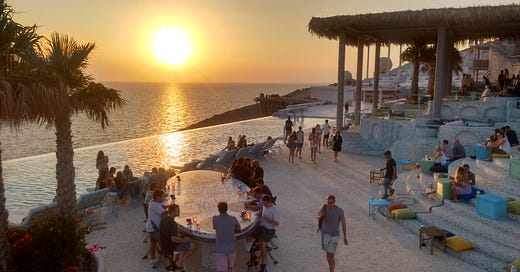What the New York Times Got Really Wrong About "Greek Party Islands Chill Out"
Oh and yeah, note to NYT section editor: what does that even mean?
Seems the “failing New York Times” (see Trump, Donald) has flunked again — this time, and perhaps not surprisingly, in the travel department.
A lengthy article by a self-described “elder millennial on the cusp of middle age” purports to detect a new trend in Greek islands, presupposing that certain ones such as Mykonos were up until now good for only one thing — partying. That is not only false, but inane. Nobody on Mykonos is going to force you to spend a day at fancypants beach clubs like Nammos or Scorpios. You do it if you want to, and if you or your Russian oligarch “friend” can pay for it.
But the piece really misses the mark with its periscopic, which is to say exceedingly narrow, view of the island of Ios, which does a have a reputation for partying, and is also home to a curious cohort of hotels under the same ownership, including one called Calilo in a remote part of the island where there used to be a pristine beach much loved by locals. The beach is still there, but unfettered access is no more. I reported on this first before the Times did.
The Times quotes Angelos Michalopoulos, “who owns and operates Calilo, as well as six other restaurants and hotels on the island.” The properties I saw, such as the Erego Beach Club, all look strange. Dali painting kind of strange. Whatever — style is whatever floats your boat.
Here’s the rich part: According to the Times’s aging millennial scribe du jour, Sheila Yasmin Marikar, “Mr. Michalopoulos had a financial firm in New York, where he and Ms. Petridou attended university. They did not intend to get into the hospitality industry, but said they saw an opportunity to preserve the island’s beauty while developing it in a sustainable way. Over the course of five years, they bought 182 parcels of land from 2,137 landowners. They got approval from the local government to build on 1 percent of the land and leave the rest untouched.”
Now, an actual reporter, as opposed to one who’s assigning editor — in this case New York Times’s travel editor Amy Virshup — might wonder about that and ask the question, How is developing a real estate project on once untouched land preserving beauty? Is that kind of like how plastic surgery preserves the beauty of Madonna’s (altered) face or Kim Kardashian’s (fake) butt?
Writers, millennials, developers, astronauts (who maybe inspired some of Erego’s far-out decor?), the Biden administration, all of these people need to take words like diversity, inclusion, sustainability and few more and make a what-are-your-prounouns compost pile out of it. They were meant to mean everything, but in reality they mean nothing.
Maybe Ms. Marikar was too high on having the Times foot her bill of “a starting rate of 660 euros” per night, if they paid it, to look into the reality of the situation, which as Kathimerini put it, is that Greek tourism is having overdevelopment issues. The article in that Greek newspaper, with which The New York Times has a formal commercial partnership, evokes “proverbial Greek rule-bending, the lack of infrastructure” and “numerous other problems in once-pristine areas.”
And how.
It is not clear from the Times pseudo-reporting what kind of “financial firm in New York” Mr. Michalopoulos had, but clearly it takes more than a few benjamins to scoop up 182 parcels of land on an island that wasn’t all that big to begin with. Maybe for The New York Times, the Pandora Papers do not exist.
But they do.
Maybe a good newspaper would ask its so-called reporters to speak with locals, and not just “authors” of tree-guzzling coffee table books. Because not all the locals are happy with developments in Ios.
Mykonos is mostly a lost cause in the sense that Venice or Times Square is a lost cause. Case in point, the legally Swedish but actually Russian oligarch in disguise Vladislav Doronin is reportedly about to plunk another one of his anodyne Aman resorts on a once-quiet beach there.
Greek islands like Ios, Paros, and Sifnos are not lost causes, in that sense.
Not yet, anyway.





